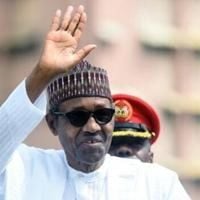On Tuesday, July 15, 2025, Nigeria bid a solemn farewell to its former president, Muhammadu Buhari, who was laid to rest in his hometown of Daura, Katsina State. The burial ceremony, held at Buhari's family compound, was attended by thousands of mourners and a host of dignitaries, including Nigerian President Bola Tinubu, Africa's wealthiest billionaire Aliko Dangote, and several regional heads of state. The event was marked by a heavy security presence, reflecting the ongoing challenges in the region and the significance of the occasion.
Buhari, who passed away at the age of 82 in a London clinic on Sunday, July 13, 2025, leaves behind a complex legacy. His political journey began as a military strongman in the 1980s, and he later transformed into a self-described "converted democrat," serving two terms as Nigeria's president from 2015 to 2023. His 2015 election was historic, marking the first time an opposition candidate defeated an incumbent leader at the ballot box in Nigeria. Yet, despite this political milestone, his tenure was met with mixed reviews.
Thousands of Nigerians gathered in Daura for public prayers before the private burial, paying their respects to a leader whose life was deeply intertwined with the nation's turbulent history. The town, usually quiet, was alive with emotion and activity as people lined the streets, braving the heat to honor Buhari, affectionately known as "Mai Gaskiya" (the truthful one). The scene was a testament to his enduring impact on the Nigerian people, even as some critics sought to diminish his contributions.
The burial ceremony itself was steeped in military honors. Images broadcast from inside the family compound showed a military band playing a final send-off, with Buhari's remains draped in the green-and-white Nigerian flag. Soldiers stood at attention, saluting as mourners, dressed in colorful kaftans, bowed their heads in respect. The flag was later removed, and Buhari's body, wrapped in white, was laid to rest. The security was so stringent that some family members, including his 78-year-old niece Fatima Isah, found themselves locked out of the compound, adding a poignant note to the proceedings.
Reflecting on Buhari's life and legacy, Nigeria's Minister of Health, Prof. Ali Pate, spoke at an expanded Federal Executive Council meeting held in his honor at the State House in Abuja on July 18, 2025. Pate emphasized that Buhari's impact remains indelible in Nigeria's history, despite a small but vocal minority attempting to tarnish his memory. "As the pages of Nigeria’s history are written in the future, President Buhari’s name will remain indelible," he asserted.
Prof. Pate highlighted several vital lessons drawn from Buhari's life, particularly his authenticity as the foundation of enduring leadership. He described Buhari as unpretentious, frugal, reserved, humble, and honest, qualities that earned him both admirers and detractors. "He was consistently loyal to Nigerians – both high and low," Pate noted, underscoring the former president's steadfast character.
Discipline and integrity were hallmarks of Buhari's persona, according to Pate. These traits fortified him against numerous personal and political challenges throughout his career. "Character moulded by self-discipline provided the scaffolding for Buhari’s courage and conviction," the minister said, acknowledging that Buhari always acted in what he believed to be the best interests of the country.
While some critics accused Buhari of being slow in decision-making, Pate defended his commitment to due process and respect for institutions. "Buhari understood leadership as stewardship," he explained. "The structure of his administration remained relatively stable for eight years." After leaving office, Buhari retired to Daura to live among his people and tend to his farm, embodying a humility reminiscent of the Roman general Cincinnatus, who famously returned to his farm after serving the public.
Buhari's personal austerity stood in stark contrast to the often lavish lifestyles of Nigerian politicians. He had no appetite for material excess, owning neither dozens of houses nor exotic possessions. "He lived a decent life. He laughed well at himself and shared joy and laughter with many," Pate recalled.
Despite the criticism that marked parts of his presidency—particularly his administration's inability to quell violence in northern Nigeria and address persistent economic woes—many Nigerians remember Buhari for his honesty and dedication. Civil servant Muttaqa Mahmud Bebeji traveled 150 kilometers from Kano to Daura to pay his respects, calling Buhari "irreplaceable." Similarly, Kabir Ibrahim, a mourner, told AFP, "Baba will be remembered for his honesty."
However, Buhari's tenure was not without controversy. His administration struggled to end insurgent jihadist attacks and armed criminal gang violence, particularly in the north. Economic challenges plagued the country, with poverty, corruption, and inequality remaining entrenched issues. Yet, Buhari's personal reputation for austerity and discipline set him apart in Nigeria's often cash-soaked political arena.
Notably, the burial ceremony attracted regional leaders despite recent diplomatic strains. Niger's Prime Minister Ali Lamine Zeine attended, marking a significant presence given the deteriorated relations following Niger's 2023 coup that ousted civilian leaders. The attendance of these dignitaries underscored Buhari's standing in West Africa and the respect he commanded beyond Nigeria's borders.
As Nigeria mourns, President Bola Tinubu has called on citizens to reflect on Buhari's life and legacy. Minister Ali Pate echoed this sentiment, encouraging Nigerians to imbibe the lessons from Buhari's life. "Of course, Muhammadu Buhari has his many failings, as any man does. Perfection is with God and it is best to leave final judgement to Him," Pate said, concluding with a prayer: "Allah forgive and grant President Muhammadu Buhari Aljannah Firdaus."
The life and passing of Muhammadu Buhari remind Nigerians of a leader who, despite imperfections, remained a figure of discipline, integrity, and personal austerity. His story is woven into the fabric of Nigeria's modern history, a chapter that will continue to provoke reflection and debate for years to come.

